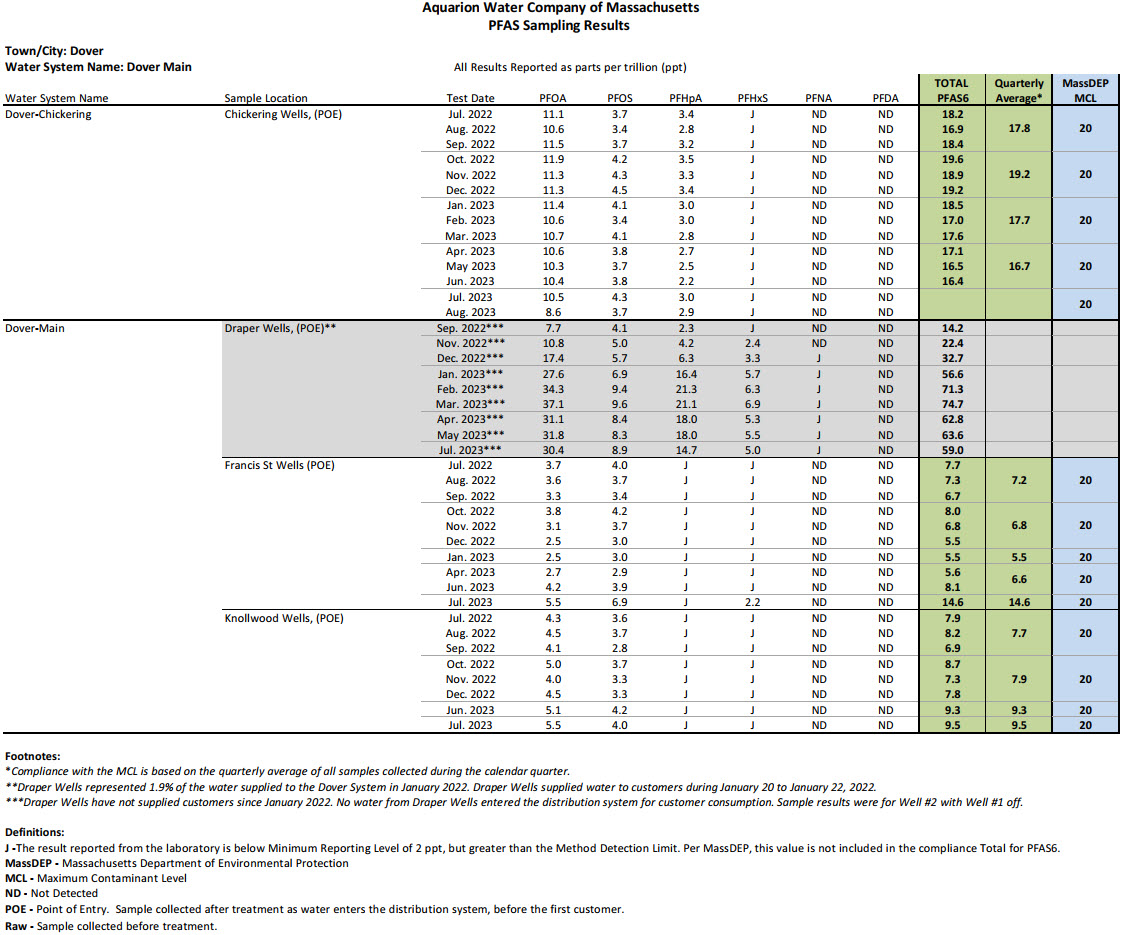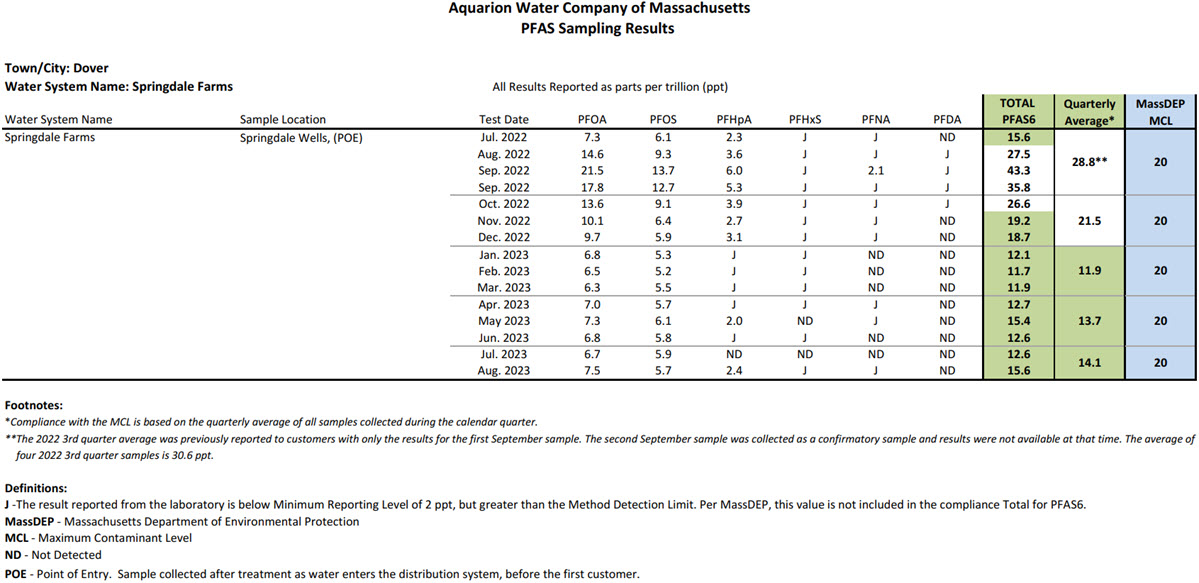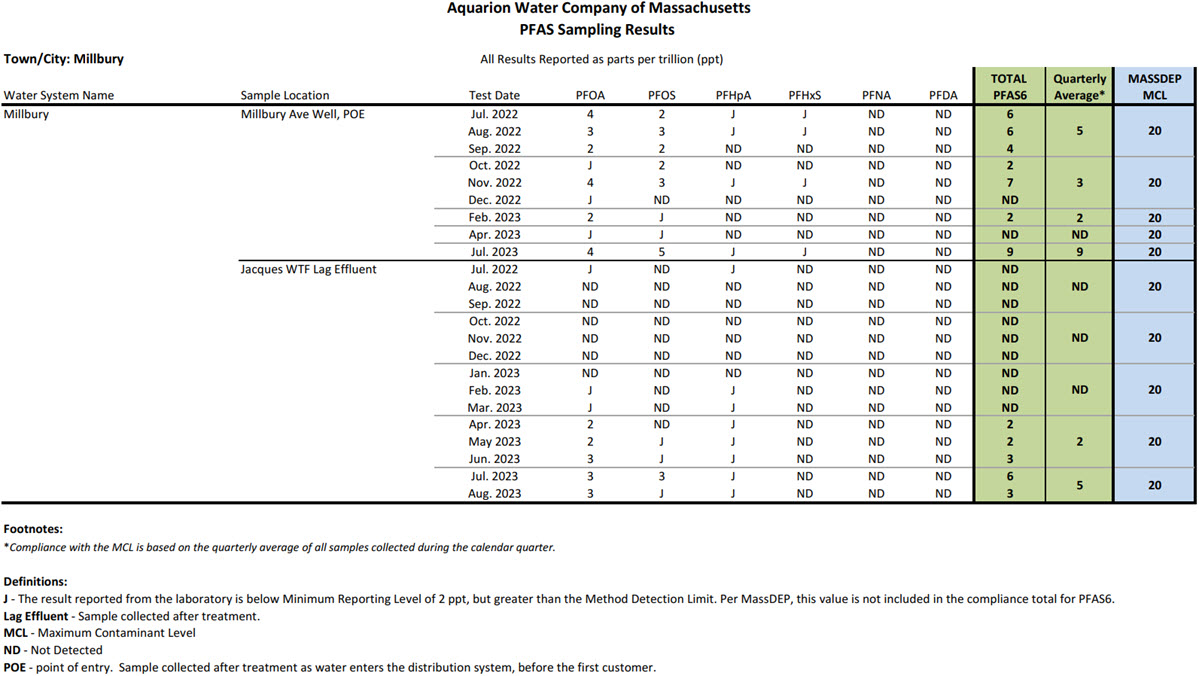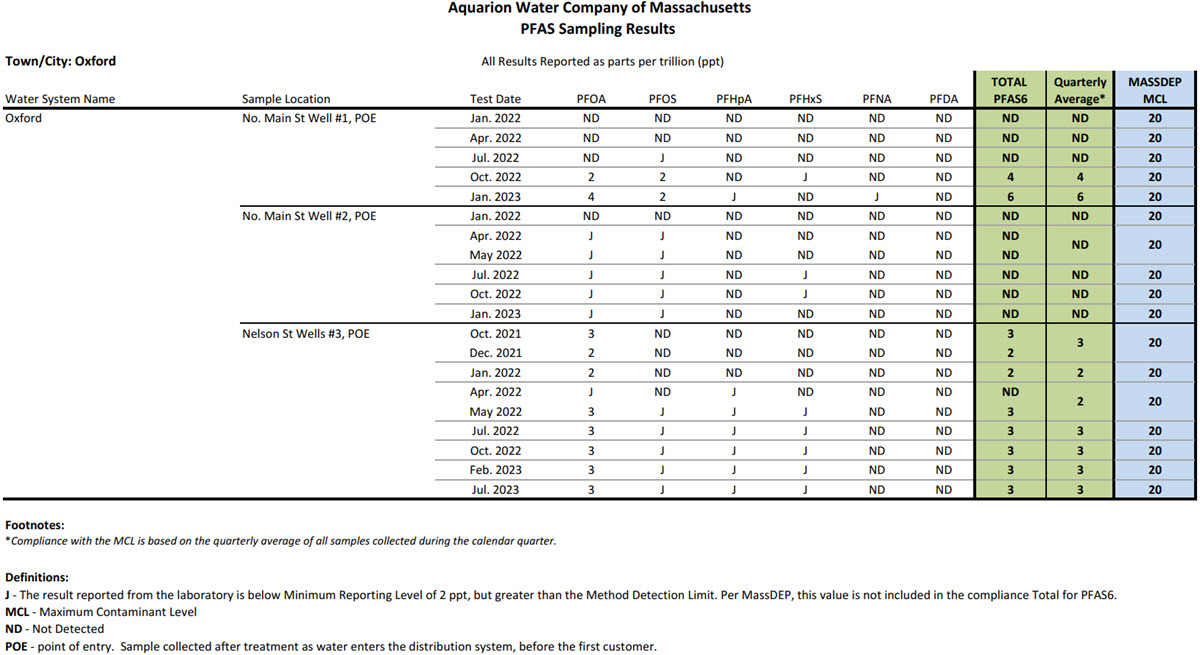MA PFAS FAQs
What is PFAS?
Throughout the northeast and across the nation, state and local officials, health departments, and water utilities including Aquarion have focused their attention on a group of human-made chemicals called per- and polyfluoroalkyl substances (PFAS).
PFAS are a family of chemicals widely used since the 1950s to manufacture common consumer products, and are also used in firefighting foams. These substances have been detected in drinking waters, including public and private water supplies, bottled water, consumer products, food, and cookware. They have been linked to a variety of health risks, particularly in women who are pregnant or nursing, and in infants.

EPA PFAS Proposed Regulation
On March 15, 2023 the US EPA proposed a National Primary Drinking Water Regulation (NPDWR) for 6 of the following PFAS Compounds: Perfluorooctanoic acid (PFOA), Perfluorooctane sulfonic acid (PFOS), Perfluorononoctanoic acid (PFNA), Perfluorohexane sulfonic acid (PFHxS), Perfluorobutane sulfonic acid (PFBS), and Hexafluoropropylene oxide dimer acid (HFPO-DA, aka GenX Chemicals). Aquarion is continuing our compliance PFAS testing program in each of our water systems to ensure our customers receive the highest quality water achievable. This proposed rule does not require action until it is finalized at the end of 2023, however, Aquarion will proactively be working to meet the proposed NPDWR.
Below are the proposed Maximum Contaminant Levels (MCLs):
- PFOA – 4 ppt*
- PFOS – 4 ppt*
- PFNA, PFHxS, PFBS, and HFPO-DA – 1.0 Hazard Index (unitless)
* ppt – parts per trillion
Until the US EPA finalizes the PFAS NPDWR Aquarion will continue to observe the below Massachusetts Department of Environmental Protection (Mass DEP) regulations.
Massachusetts PFAS Regulation
On October 2, 2020, a new enforceable water quality regulation for PFAS chemicals in public drinking water was established by the Mass DEP. The regulation provides a stringent Maximum Contaminant Level (MCL) water quality standard of 20 parts per trillion (ppt) for the sum of six PFAS chemicals, and also includes monitoring, reporting, and public notification requirements. Drinking water containing a total of 20 ppt or less of the six regulated PFAS chemicals is deemed safe to drink. If drinking water is found to contain more than 20 ppt of these PFAS chemicals, then the water supplier must work with Mass DEP to lower the PFAS level in order to achieve compliance with the standard.
Our Testing Results
Dover Systems PFAS Sampling Results
We sample our water systems in Dover for PFAS in accordance with Mass DEP requirements. Sampling results are shown in the data table below for our wellfields in Dover.
- Draper Wellfield - The PFAS levels in the water produced from the Draper wellfield exceeded the MCL of 20 parts per trillion (ppt) in January 2022. Less than 2% of the water we produced in January came from the Draper wellfield. This wellfield has remained offline since that time.
- Springdale Farms Wellfield - Results indicate that the PFAS6 levels in the water from these wells exceeded the MCL for the periods 07/01/2022 to 09/30/2022 and 10/01/2022 to 12/31/2022. PFAS levels subsequently decreased and were below the MCL in early 2023. Please refer to our Dover Water System Update webpage for more information about this topic.
Moving forward, PFAS results will continue to be shared for the water produced from our wellfields in Dover.
We will continue to utilize wells that have the highest quality water in order to optimize water quality for our customers in Dover.


Millbury System PFAS Sampling Results
In October 2019, we voluntarily sampled water from all three of our water supply well locations in the Millbury system.
The initial sampling results that we received from our laboratory on October 21, 2019, indicated that the level of PFAS found in our Oak Pond Well exceeded the original Mass DEP guideline of 70 ppt. As a result, Aquarion immediately turned off the Oak Pond Well and consulted with Mass DEP. The Oak Pond well remains out of service until further notice while we investigate alternative supply and treatment solutions.
Sample results from our two other water sources in Millbury (the Jacques Wells and the Millbury Avenue Well) showed levels of PFAS below the Mass DEP guidelines in place at the time and also below the new MCL of 20 ppt. Test results confirm that none of the 6 PFAS compounds covered by the Mass DEP MCL of 20 ppt were present in any of those samples, and that two additional PFAS compounds were present at levels below 20 ppt. These two water supply sources remain in service.
In March 2020, we tested source water in the two Jacques Wells and after the treatment systems currently in place at the Jacques facility. This supplemental testing determined that there are low-level PFAS concentrations present in both of the Jacques Wells, and that our ion exchange treatment system is removing PFAS. On March 30, 2020, we completed the annual maintenance of our ion exchange treatment system to ensure the highest level of water quality delivered from the Jacques facility. Follow-up sampling in May 2020 confirmed that no PFAS chemicals were detected in the water leaving our treatment facility. We continue to monitor treatment performance to ensure the highest level of water quality.
Please refer to the data table below for test results from Millbury source water, treated water, and distribution system water.

North Plymouth PFAS Sampling Results

Oxford System PFAS Sampling Results
In October 2019 and April 2020, we voluntarily performed PFAS testing at our water supply wells in the Oxford system. Test results showed that the levels of PFAS detected were well below the Mass DEP MCL of 20 ppt. We have subsequently sampled our water supply wells to ensure that levels of PFAS remain low.

Sheffield PFAS Sampling Results

